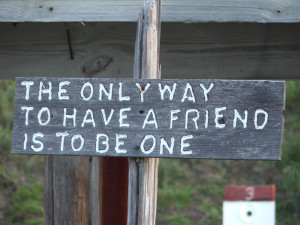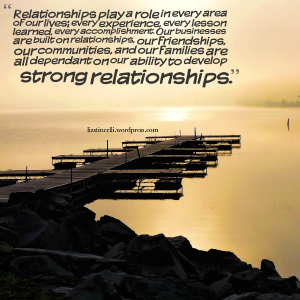 “Trust is the glue of life. It’s the most essential ingredient in effective communication. It’s the foundational principle that holds all relationships.” – Stephen Covey
“Trust is the glue of life. It’s the most essential ingredient in effective communication. It’s the foundational principle that holds all relationships.” – Stephen Covey
This year I am focusing on everyday leaders. Not those who hold a formal position of authority, but those of us who, through our behaviors, have the ability to influence and inspire those around us just by being us. This is the twelfth and final installment of articles that focus on one specific behavior that can make a huge difference in our ability to impact the lives of others.
This month I want to talk about trust. What does trust have to do with being an everyday leader? Trust is a vital component of leadership. Everyday leaders earn the trust of those the work with through both their words and actions. They also understand that trust is a two-way street and strive to demonstrate their trust in others. So, what does trust look like in everyday leadership?
Authenticity:
Everyday leaders are authentic. They have nothing to hide; no hidden agendas, no secrets. You can count on an everyday leader to be real with you; no having to second guess what their true intentions are. It is this authenticity that proves to others that they can be trusted. Authenticity gives everyday leaders a powerful influence in the environments in which they work.
Respect:
The respect they show toward others speaks to the character of everyday leaders. Respect and trust go hand-in-hand. Everyday leaders stand out from the crowd because of the mutual respect and trust that they develop with others. When it comes to deciding whom to follow, those who show respect and are respected will come out ahead every time.
Relationships:
Leadership is all about relationships and everyday leaders are expert relationship builders. These relationships are built on a solid foundation of trust. Everyday leaders are able to influence and inspire others, in large part, because of the solid relationships they develop and maintain.
Everyday leaders have a strong influence because they are trusted. They are authentic and true. They earn respect and give it in return. The build strong relationships. These behaviors place everyday leaders in a position of influence where they can have an impact in the lives of those they work with.
How can you start earning trust today?
© 2018 Liz Stincelli
I am passionate about recognizing and inspiring the leader in each of us. I am the Founder of Stincelli Advisors where I focus on helping organizations change attitudes, change communication dynamics, improve collaboration and problem-solving, engage employees, and strengthen organizational culture. I am the author of “Overcoming Barriers in Your Leadership”. I am a Training Partner with StephenK Leadership. I hold a Doctor of Management degree with an emphasis on organizational leadership.
Learn more about me by visiting my website, stincelliadvisors.com and connect with me on Twitter @infinitestin, Google+, and LinkedIn. You can contact me by email at stincelliadvisors@gmail.com.









